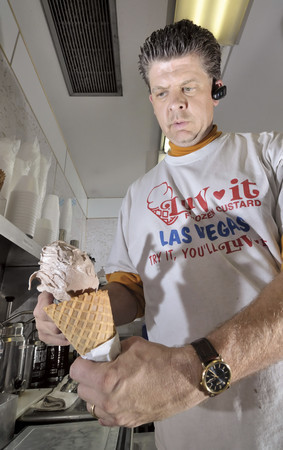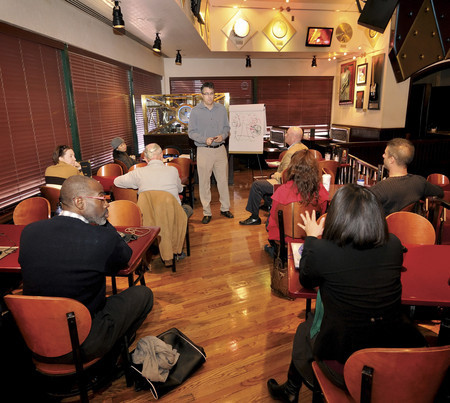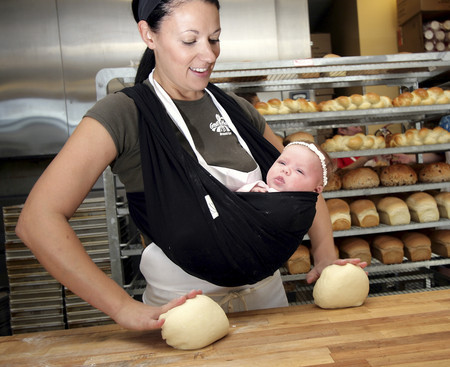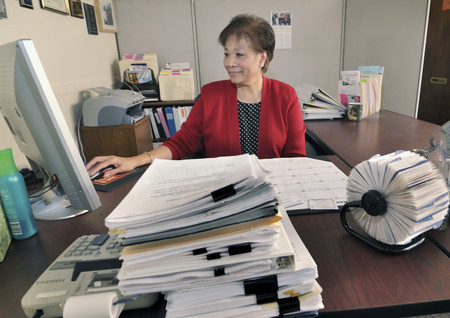Some local business owners profiting during downturn
The rain is coming down in sheets, and weather prognosticators are forecasting snow, but people are still lining up outside the little frozen custard store tucked away behind an AM-PM mini mart, just off Las Vegas Boulevard.
Luv-It Frozen Custard owner Greg Tiedemann diligently mixes custard shakes and dispenses frozen custard cups to die-hards waiting outside in the rain. In spite of temperatures dipping into the mid-40s by the late afternoon, the customers don't let up long enough for the owner to sit for an interview with a reporter.
Tiedemann and his wife, Sharon, have owned the store since the late 1990s, purchasing it from his grandmother, co-founder Dorothy Woods. Luv-It was opened in the same spot, at 505 E. Oakey Blvd., in 1973, by Dorothy and husband, Richard. Their grandson Greg has found a recession-proof formula to keep it successful: Leave it alone.
"If it's not broke, why fix it?" he says as he makes an eggnog custard cone. "People take over family businesses and they try to change the whole concept. I tweaked this, but I didn't change the concept."
Luv-It stays so busy that fretting over the local economy is a luxury Greg can't afford.
And the recession? "I haven't had time to think about it," he says as he takes orders.
A slew of "best of" awards, and media mentions such as on CBS' "Late Late Show with Craig Ferguson" have helped to draw international customers and a cult following for Luv-It. But some other local companies are also thriving amid Las Vegas' worst economy since the 1930s.
Some of those companies performing the best in the downturn have found a way to capitalize on the recession. One of those squeezing lemons and mixing lemonade is Las Vegas Fast Wrap owner Garth Harris. He went from economic victim to successful franchisee in just 10 months.
Harris' last company, Line-X of Las Vegas, went out of business in April after the market for its spray-on truck bed liners vanished. But by then, he was already making the local Fast Wrap a winner.
Seeing the growing demand for protective wrapping for stalled housing and commercial developments, Harris invested $40,000 to open the Fast Wrap Las Vegas franchise in February. He has already generated revenues of between $130,000 to $140,000, including at least $40,000 to wrap portions of Boyd Gaming Corp.'s stalled Echelon resort earlier this year.
Boyd halted construction of the $4.8 billion project in August 2008. Many lost work and revenue as a result of the decision to mothball Echelon, but it ultimately meant big business for Harris' Fast Wrap.
"If Echelon hadn't shut down, I wouldn't have wrapped it," he said. "The recession has actually helped us."
Fast Wrap didn't cover all of the ill-timed megaresort, but enough to make it worth Harris' time. That, combined with other major projects such as one for energy company Calpine Corp. and for the city of Henderson, has allowed Fast Wrap to add employees at a time when others are laying people off.
"I am going to hire two more people tomorrow," Harris said in a Nov. 30 interview.
And Fast Wrap incorporates a business model that's recession-friendly but not recession-dependent. When the economy improves, his customer base will simply change. He'll wrap luxury items, such as boats.
Departing residents, and those losing their homes to foreclosure, call on Fast Wrap to wrap and protect valuable furniture.
"I have a contract with a local storage facility to wrap furniture being put in storage," he said.
Stevenson Brooks is looking at the recession as a selling point for his 31/2-year-old franchise because that's what he teaches -- sales. The owner of the local Sandler Training franchise said the harsh economy has changed the way potential customers view his services.
"The recession helped my business," Brooks said. "Three years ago, I had to sell to people who said, 'I have more sales than I can handle.' Now, they need to maximize their sales and profit."
A $60,000 initial investment to buy the local Sandler Training franchise has proved to be a good idea. Clients such as the Blue Man Group, the Hard Rock Cafe and Allegiant Air are using Brooks to motivate and train their sales staffs.
Profits are up by $30,000 from last year, with the biggest gain coming in the second half of 2009. Brooks received a Biz E Award from the Las Vegas Chamber of Commerce in September.
Brooks sees himself as a motivator for salespeople who might have been more like "order takers" in boom times.
"Now, it's my job to take seasoned salespeople and teach them to become salespeople," Brooks said. "They are used to people calling and saying, 'I want to buy something.' "
Stretching every dollar has become a key survival tactic for local companies and consumers. Businesses offering to assist in increasing revenue have found the welcome mat. Jay Schwartz's Web designing and viral marketing venture IdeaWork, like Brooks' Sandler Training, has found renewed respect during the recession.
"I think the recession has actually helped us because what we do brings in revenue at a lower cost. Why spend $7,000 to $10,000 for billboards when you can get a marketing campaign from us for less, and reach more people?" Schwartz said.
IdeaWork has done well during the downturn. Schwartz is still compiling 2009 numbers, but said revenue was up by $100,000 from 2007 to 2008. Economists officially put the start of the recession as December 2007.
The 5-year-old IdeaWork has offices in Las Vegas and Santa Barbara, Calif., but about 70 percent of the business is generated in Southern Nevada. Major clients include Station Casinos, MGM Mirage, Harrah's Entertainment and the Hard Rock Cafe.
Some clients dropped IdeaWork's services because of economic hardship, but Schwartz said those were smaller companies. Even that loss of business turned into a positive.
"We were operating at capacity, and some of those clients were lower billables, and maybe having them contract opened the door for bigger ones," Schwartz said.
IdeaWork has 10 employees between locations in Southern Nevada and Southern California. Schwartz sees business as good enough to probably add a few more employees in Las Vegas early in 2010.
"We have expanded our region to Northern Nevada," he said. "Last year was a record year."
Sometimes maximizing revenues can equate to recouping some of the potential losses. Local furniture store operator Colleen Aiken saw an upswing in good consignment furniture at the beginning of the recession as homeowners shed pricey furniture when facing foreclosure.
Many turn to Aiken's three valley Colleen's Classic Consignment stores, two of which she opened since the recession began. Her 40,000-square-foot Henderson store opened in August 2008. She purchased the old 16,000-square-foot Ethan Allen location on South Rainbow Boulevard in September.
"I am one of those people who is crazy enough to open stores in a recession," Aiken said with a laugh. She's been in business for nearly 15 years.
A look around the stores on North Rainbow and South Rainbow gives the impression of a new, high-end furniture shop, and some of the furnishings are close to new. Aiken gets "a huge amount" of World Market Center samples, such as Aico and FX. She may get them for as much as 50 percent off and pass much of the savings on to her customers.
"I do well in a good economy and succeed or sustain in a bad economy, because (people) don't have $10,000 for an Ethan Allen bedroom set, but they can get it for $4,000 from me."
Business just keeps on coming. The wave of foreclosure-driven consignments has abated. But now homebuilders are closing out developments and looking to make whatever they can off their model homes' furnishings.
Combined store sales have risen from $600,000 to as much as $800,000 a month. Aiken hired 12 more employees this year and 20 additional workers in 2008.
"I am still growing in a bad economy," she said.
A recession doesn't punish all businesses, but most of them are hit. U.S. Small Business Administration Nevada District Director John Scott said certain types of companies are in demand right now. Among them: security firms, guard-service suppliers and residential short sellers.
Handymen and auto-repair services are added to that list by Nevada MicroEnterprise Initiative Operations Manager Anna Siefert.
"People know if they can't sell their homes, they will live in them for the next five years and want to fix it up," she said.
The Great Harvest Bread Co. at 10180 W. Tropicana Ave. had neither a recession-friendly product like a Fast Wrap nor the fame of Luv-It. However, husband-and-wife franchisees Tina and Kevin Yancey did the nearly impossible and increased profits by about $8,000 this year.
That's no small feat considering a slew of their shopping center's tenants fled, including foot-traffic magnet Starbucks. Revenues dropped sharply as a result. The Yanceys responded by comparison shopping for products, cutting thousands off their vendor bills. They cut labor expenses without laying anyone off. The couple started working more efficiently.
"Hi Ruth! Hi Sergio!" Tina Yancey calls out, waving to regular customers as she bakes, all the while carrying around her infant daughtwer Sophia.
"I try to know everybody by name," she said. "It is important."
Contact reporter Valerie Miller atvmiller@lvbusinesspress.com or 702-387-5286.




















